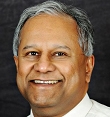Canadians should be having an informed discussion about their country’s involvement in the fight against ISIS (Islamic State in Iraq and Syria). This was the advice given by Rami Khouri, Senior Fellow at the Issam Fares Institute, American University of Beirut (AUB), during a lecture in Toronto last week titled “Beyond Sunnis and Shiites: Understanding the Turbulent Reconfiguration of Arab States and Citizens.”
Quipping that he expected to see some rational thinking north of the U.S. border, Khouri said America is again leading a military adventure in the Middle East about which it has “no clue.” Former Canadian foreign minister Bill Graham, who was present at the lecture, agreed with Khouri and recalled that one of his proudest moments in office was when then Prime Minister Jean Chrétien resolutely decided against joining the U.S.-led invasion of Iraq in 2003.
It is no surprise that not one among the 22 Arab countries is democratic and the Middle East as a whole is the only region in the world that has remained undemocratic as a whole.
Khouri said defeating ISIS by military means will only bring about a temporary respite in the continuing bubbling of Islamist movements across the Arab world if the underlying conditions that gave rise to in the first place persist. He said these conditions were brought about by corruption, mismanagement of national resources, poor governance, widespread disparities in society, abuse of power, incompetence in confronting Zionism and its threats, subservience to foreign powers, and the dominance of society by single families and their cronies.
Tunisian example
Giving a broad sweep of the troubled history of the Middle East over generations, Khouri said much of its current problems could be traced back to the many Western interventions over the years starting from the First World War. Adding to the turbulence was the undefined link between citizen and state in the countries carved out of the defeated Ottoman Empire. “The citizenry never played a role in the forming of these states and there never was a social contract between them.”
It is no surprise that not one among the 22 Arab countries is democratic and the Middle East as a whole is the only region in the world that has remained undemocratic as a whole, Khouri said. This structural fault led to the eruption of anger during the Arab uprising that began in December 2007 and whose repercussions are still being felt, he said. “The established systems are being challenged while a whole new order is still being fashioned.” Pointing out last month’s Tunisian election as a good case study of the evolutionary process, Khouri said it was the first-ever constitutional exercise seen in the Arab world.
People were treated as animals and are now some are behaving like animals.
Pointing out that binary and linear connections cannot be applied to current events in the Arab world, Khouri said one must understand that a series of epic developments are happening there simultaneously. “Demands for citizenry rights, constitutional reforms and social justice have come up together unlike in other parts of the world where they came in progression.”
Consequence of dysfunction
“ISIS is a logical consequence of the dysfunction experienced by the people over the years. It is a reaction that is not coming out of a vacuum and is doing exactly the same thing as the marauding Bedouin tribes who carved out territories for themselves in the wake of retreating European powers from the region after the two world wars,” Khouri said. “Instead of the European powers, central governments are in retreat in the Arab world today and all kinds of groups are filling the gaps. ISIS is but one such extreme manifestation emanating out of the dehumanizing of populations by various regimes. People were treated as animals and are now some are behaving like animals.”
Whatever else it represents, in contemporary terms, ISIS is the latest manifestation of at least half-a-dozen other Islamist movements in Arab society since the 1970’s, Khouri said. “The very different natures of these movements and the reasons for their emergence should be noted by anyone interested in understanding how ISIS came to be and how it could be confronted and defeated.”
However, the Middle East scholar said, the threat posed by ISIS should not be exaggerated. “This criminal cult of social misfits have no anchors in the community. They are trying to resolve the stress felt by society by banking on Islam which is a strong part of the people’s identity.” He reminded the audience that the civil rights movement in the U.S. was led by Christian churches. “The Islamists very well understand the power of religion.”
The lecture was co-hosted by the Canadian Arab Institute, The Bill Graham Centre for Contemporary International History and the Toronto AUB alumni association.
Ranjit is a Toronto-based writer with interest in Canadian civic affairs, immigration, the environment and motoring. Maytree and Al Jazzera English alumnus.




